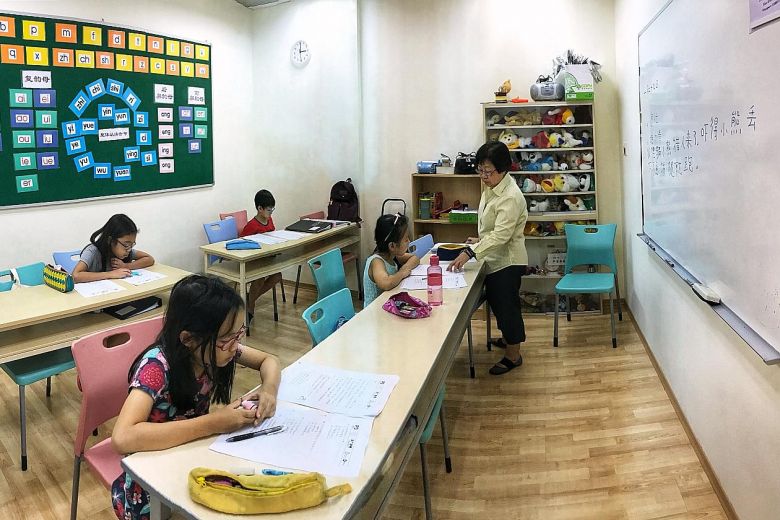When students sign up for Chinese language tuition, it is usually because they wish to score better in a subject that many flounder in.
But Mr Ann Jong Juan, founder and principal of Han Language Centre, which was set up in 1993 and has 18 branches, wants to cultivate a genuine interest in the language.
Many students throw their textbooks away or sell them after the exams, he noted.
“But we are not just here for exams, we want them to learn Chinese well, fall in love with the language; scoring well in the exams is just a by-product of learning,” said Mr Ann, 70, a playwright who writes under the name Han Laoda and was a winner of the Cultural Medallion for drama in 1990. In May this year, he won the inaugural Singapore Chinese Cultural Centre Award for his contributions to Singapore’s Chinese culture.
With Singapore Press Holdings’ (SPH) acquisition of a 75 per cent stake in the Chinese education brand fully completed last Wednesday, the centre now has more resources to expand its range of programmes.
Its staff strength has been boosted from 98 to 108, comprising educators with prior experience developing and teaching the Ministry of Education curriculum.
From next year, all classes at the enrichment brand’s centres will formally incorporate 10 to 30 minutes of cultural appreciation in every lesson. This is part of a more concerted push to instil a love and appreciation for the Chinese language and culture.
For example, Primary 1 pupils will learn about the etymology of new words introduced to them in the curriculum, or be introduced to the history of Chinese cultural festivals, such as the Dragon Boat Festival.
At the secondary school level, students can learn new vocabulary through popular songs or music videos.
Mr Ann said that there are also plans to work with schools to provide enrichment programmes in areas, like speech and drama, which complement the teaching of the Chinese curriculum.
Ms Lee Huay Leng, head of SPH’s Chinese Media Group (CMG), added that with SPH now having direct oversight of operations at Han Language Centre, the latter can tap CMG’s strengths to offer programmes to familiarise adults with modern Chinese culture.
She said that rather than offering classes on ancient Chinese philosophy – which universities already do – the centre can explore providing adult classes on the Chinese business and political environment, given China’s dominance in the global market.
Mr Ann said the centre also sees a need to introduce such facets of knowledge to young students. “The development of modern China can affect (both students and parents) now, it’s something that they may not be exposed to in schools but it’s an exposure that we want to give to both students and adults.”
Secondary 2 student Lim Yan Zhe, from River Valley High School, started going for classes at Han Language Centre to prepare for her Primary School Leaving Examinations (PSLE). The 14-year-old did well in her PSLE, but continued taking weekly classes at its Khatib branch.
She said: “I don’t think of the classes as tuition because we get to hear many stories about Chinese culture in our lessons. (The classes) helped to make Chinese easier for me, and more interesting.”
Article & Photo from Straits Times


